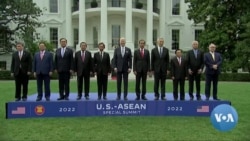The U.S.-ASEAN summit ends without a strong condemnation of Russia’s war on Ukraine.
Hello and welcome to VOA Asia Weekly. I'm Chris Casquejo in Washington. That story coming up.
But first, making headlines.
Sri Lanka became the first Asia Pacific country to default on its sovereign debts this century. The country has been mired in mounting economic difficulty and political instability.
Some residents in downtown Shanghai were let out of their homes as the city gradually eased a weeks-long coronavirus lockdown.
Beijing authorities have banned dining at restaurants and closed some other public venues to stamp out a COVID outbreak.
North Korean state media have increased coverage of the country's explosive coronavirus outbreak while silent on South Korea’s repeated offers to help.
South Korea has decided to participate in the Indo-Pacific Economic Framework, a U.S.-led effort to counter China's influence in the region.
U.S. President Joe Biden is traveling to South Korea and Japan – his first trip to Asia since taking office.
Japan is hosting a meeting of the Indo-Pacific strategic alliance known as the Quad with the leaders of the U.S., Australia, and India.
It comes after the U.S.-ASEAN Summit ended without a condemnation of Russia's invasion of Ukraine. VOA’s Patsy Widakuswara reports.
"An Indo-Pacific that is free and open, stable and prosperous, and resilient and secure is what we're all seeking."
Biden did not mention Ukraine in his remarks, and the summit ended without a condemnation of Russia.
The Association of Southeast Asian Nations, or ASEAN, has avoided criticizing Russian President Vladimir Putin. Many in the group seek neutrality, including Indonesia, which has resisted pressure to exclude Putin from the November G-20 summit in Bali despite Biden’s and other Western leaders' threats of a boycott.
"Our hope is to see the war in Ukraine stop as soon as possible and we give the peaceful resolution of the conflict a chance to succeed."
It's a sign of the geopolitical complexities in the region as the administration seeks to broaden the coalition against Moscow beyond Europe.
"The Biden administration sees ASEAN countries as a vital partner in competition with China, so it's not willing to sour relations over a statement about Russian aggression."
The U.S. announced a total of $150 million in initiatives for the region in climate and health infrastructure projects, including $60 million for maritime security – a concern for many regional states wary of Beijing's increasing militarization in the South China Sea.
While many question the low dollar figure amid the tens of billions of dollars being poured into Ukraine, the summit signaled a U.S. focus on the Indo-Pacific region.
"Diplomacy is about showing up, and most everybody showed up. Despite the focus on Ukraine, President Biden and most of U.S. government took out two days to stand on ASEAN. So in that sense, it was a success."
U.S. and ASEAN leaders also expressed concern over the crisis in Myanmar and commitment to denuclearization in the Korean Peninsula.
Patsy Widakuswara, VOA News, at the White House.
Visit our website voanews.com for the most up-to-date news. This is VOA Asia Weekly.
Investigators probing the crash of a China Eastern Airlines jet are examining whether it was the result of an intentional action taken on the flight deck.
So far, there is no evidence of a technical malfunction.
The Boeing 737-800 crashed on March 21st, killing all 123 passengers and nine crew members onboard.
UN human rights chief Michele Bachelet will visit China next week.
Her office has been seeking the visit since 2018 to investigate the human rights situation including mass incarceration in the northwestern region of Xinjiang.
A fuel crisis is deepening in Laos as suppliers struggle to meet demand.
A weakened kip currency, high inflation and unstable global oil market have left the country’s fuel importers unable to meet public demand, the Vientiane (vyen-tyan) Times reported.
Finally on VOA Asia Weekly, the world's oceans grew to their warmest and most acidic levels on record in 2021.
Oceans bear much of the brunt of greenhouse gas emissions. They absorb around 90 percent of the Earth's accumulated heat and 23 percent of the carbon dioxide emissions from human activity.
Thanks for watching VOA Asia Weekly. I’m Chris Casquejo. See you next week.











